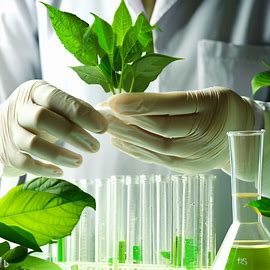Top Biotechnology Careers: Unleash the Potential of Science.
In this article, we will cover Biotechnology, and the Top Biotechnology Careers along with its development through the years.
Definition of Biotechnology:
Biotechnology is a field that utilizes biological processes, organisms, or systems to develop innovative products, technologies, and solutions for various industries. It involves the application of scientific knowledge and techniques to manipulate living organisms or their components to improve human health, agriculture, industry, and the environment.

Invention and Purpose of Biotechnology:
Biotechnology has a long history, dating back to the early days of civilization. The invention of biotechnology can be traced to the domestication of plants and animals, as well as the discovery of fermentation. These early applications led to the development of products such as bread and vaccines.
The purpose of biotechnology is to harness the power of biology to address societal challenges and improve human well-being. It aims to develop new products, methods, and organisms that can enhance human health, agriculture, industry, and the environment. Biotechnology has evolved significantly over time, with modern practices involving genetic engineering and manipulation of genetic structures and biomolecular processes.
Milestones in Biotechnology:
- 1919: Hungarian scientist Karl Ereky coins the term “biotechnology”.
- 1928: Alexander Fleming discovers penicillin, the first true antibiotic.
- 1943: Oswald Avery proves DNA carries genetic information.
- 1953: James Watson and Francis Crick discover the double helix structure of DNA.
- 1960s: Insulin is synthesized to fight diabetes, and vaccines for measles, mumps, and rubella are developed.
- 1969: The first synthesis of an enzyme in vitro is conducted.
- 1973: Herbert Boyer and Stanley Cohen develop genetic engineering with the first insertion of DNA from one bacteria into another.
- 1980s: The first biotech drugs to treat cancer are developed.
- 1982: A biotech-developed form of insulin becomes the first genetically engineered product approved by the U.S. Food and Drug Administration (FDA).
- 1983: The first genetically modified plant is introduced.
- 1993: GMOs are introduced into agriculture with the FDA approval of growth hormones that produce more milk in cows.
- 1997: The first mammal is cloned.
- 1998: The first draft of the Human Genome Project is created, facilitating research on treatment of diseases such as cancer and Alzheimer’s.
- 2010: The first synthetic cell is created.
- 2013: The first bionic eye is created.
- 2020: mRNA vaccine and monoclonal antibody technology is used to treat the SARS-CoV-2 virus.
Top Biotechnology Careers:
Biotechnology is a fleetly growing field that combines biology, technology, and invention to develop new products and results for colorful diligence. From healthcare to husbandry, biotechnology has the implicit to revise the way we live and work. However, then are some of the top biotechnology careers to consider. If you have a passion for wisdom and want to make a difference:
1. Biomedical Engineers:
Biomedical masterminds dissect and design results to problems in biology and drug. They work towards perfecting the quality and effectiveness of patient care. With a projected growth rate of 27% from 2012 to 2022, this career offers excellent openings for advancement.
Qualifications: Biomedical engineers typically need a bachelor’s degree in biomedical engineering or a related field. Some positions may require a master’s or doctoral degree.
Mean Annual Salary: The mean annual salary for biomedical engineers is around $95,090.
2. Medical and Clinical Technicians or Technologists:
Medical laboratory technologists and technicians play a pivotal part in diagnosing medical conditions through laboratory procedures. With a projected growth rate of 22% from 2012 to 2022, this career path offers a promising future in the biotechnology assiduity.
Qualifications: Medical laboratory technologists and technicians usually need a bachelor’s degree in medical technology or a related field. They may also need to be certified or licensed depending on the state.
Mean Annual Salary: The mean annual salary for medical and clinical laboratory technologists and technicians is around $54,780.
3. Biophysicists and Biochemists:
Biochemists and biophysicists study the chemical and physical principles of living effects. They contribute to advancements in cell development, growth, and heredity. With a projected growth rate of 19% from 2012 to 2022, this career offers instigative openings for exploration and discovery.
Qualifications: Biophysicists and biochemists typically need a Ph.D. in biophysics, biochemistry, or a related field for research positions. Some entry-level positions may only require a bachelor’s or master’s degree.
Mean Annual Salary: The mean annual salary for biophysicists and biochemists is around $105,940.

4. Medical Scientists:
Medical scientists conduct exploration aimed at perfecting overall mortal health. They use clinical trials and other investigative styles to reach their findings. With a projected growth rate of 13% from 2012 to 2022, this career path is ideal for those interested in making a significant impact on healthcare.
Qualifications: Medical scientists usually need a Ph.D. in biology or a related field. Some positions may require a medical degree (M.D.) or a combination of a Ph.D. and medical degree.
Mean Annual Salary: The mean annual salary for medical scientists is around $88,790.
5. Epidemiologists:
Epidemiologists probe patterns and causes of complaint and injury in humans. They play a vital part in public health and contribute to the forestallment and control of conditions. With a projected growth rate of 10% from 2012 to 2022, this career offers openings to make a difference in population health.
Qualifications: Epidemiologists typically need at least a master’s degree in public health or a related field. Some positions may require a Ph.D. for advanced research or teaching roles.
Mean Annual Salary: The mean annual salary for epidemiologists is around $75,690.
6. Bio Technicians:
Biological technicians help scientists in conducting laboratory tests and trials. They play a pivotal part in advancing scientific exploration and development. With a projected growth rate of 10% from 2012 to 2022, this career path offers hands- on experience in the biotechnology field.
Qualifications: Biological technicians usually need a bachelor’s degree in biology or a related field. Some positions may only require an associate degree or a certificate.
Mean Annual Salary: The mean annual salary for biological technicians is around $47,640.
7. Microbiologists:
Microbiologists study microorganisms similar as bacteria, contagions, and fungi. They contribute to advancements in colorful diligence, including healthcare, husbandry, and environmental wisdom. With a projected growth rate of 7% from 2012 to 2022, this career offers openings for exploration and invention.
Qualifications: Microbiologists typically need at least a bachelor’s degree in microbiology or a related field. Some positions may require a master’s or doctoral degree for advanced research or teaching roles.
Mean Annual Salary: The mean annual salary for microbiologists is around $81,150.
8. Process Development and R&D Scientists:
These experts oversee the manufacturing process in a company or association’s lab. They play a pivotal part in developing new technologies and perfecting effectiveness. With their moxie, they contribute to the growth and success of the biotechnology assiduity.
Qualifications: Process development and R&D scientists usually need a bachelor’s or master’s degree in a relevant field such as biotechnology, biochemistry, or chemical engineering. Some positions may require a Ph.D. for advanced research roles.
Mean Annual Salary: The mean annual salary for process development and R&D scientists can vary depending on the specific role and industry.
9. Regulatory QA/ QC Biomanufacturing Specialists:
Regulatory QA/ QC biomanufacturing specialists insure that all criteria and conditions are met during the manufacturing process. They play a vital part in maintaining quality norms and icing compliance with regulations. With their moxie, they contribute to the safe and effective product of biopharmaceuticals.
Qualifications: Regulatory QA/QC biomanufacturing specialists typically need a bachelor’s degree in a relevant field such as biotechnology, biology, or chemistry. They may also need knowledge of regulatory requirements and quality control processes.
Mean Annual Salary: The mean annual salary for regulatory QA/QC biomanufacturing specialists can vary depending on the specific role and industry.
10. Bioproduction Drivers:
Bioproduction drivers oversee the manufacturing, packaging, and shipping of biotechnology products. They insure that products meet quality norms and are in pristine condition before reaching the request. With their attention to detail, they contribute to the success of biotechnology companies.
Qualifications: The qualifications for bioproduction drivers can vary depending on the specific role and industry. Some positions may require a high school diploma or equivalent, while others may require a bachelor’s degree or specialized training.
Mean Annual Salary: The mean annual salary for bioproduction drivers can vary depending on the specific role and industry.

These top biotechnology careers offer a wide range of openings for individualities passionate about wisdom and invention. Whether you’re interested in exploration, development, or manufacturing, there’s a biotechnology career that suits your chops and interests. Unleash the eventuality of wisdom and make a difference in the world through a satisfying career in biotechnology.
That concludes our article on “Top Biotechnology Careers”. Check out more at LinkedIn.
Continue Reading: Any Video Converter Free (8.2): Powerful Converting Software

